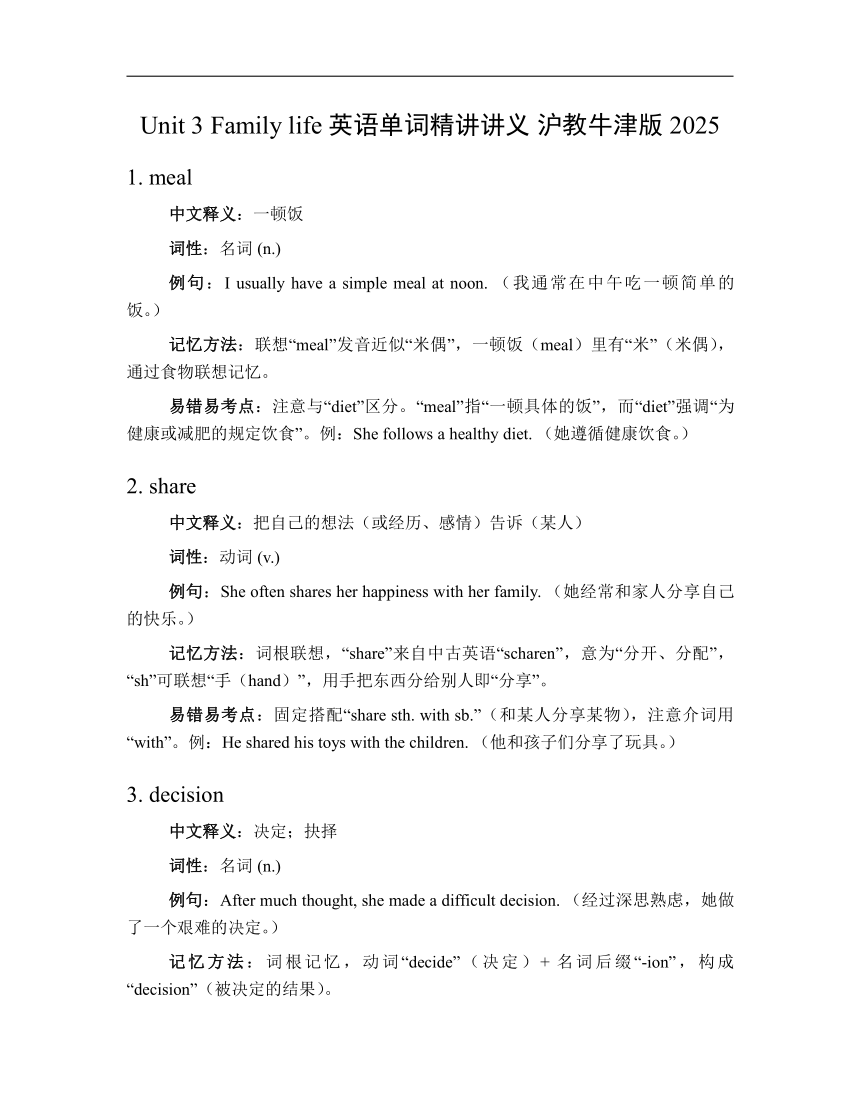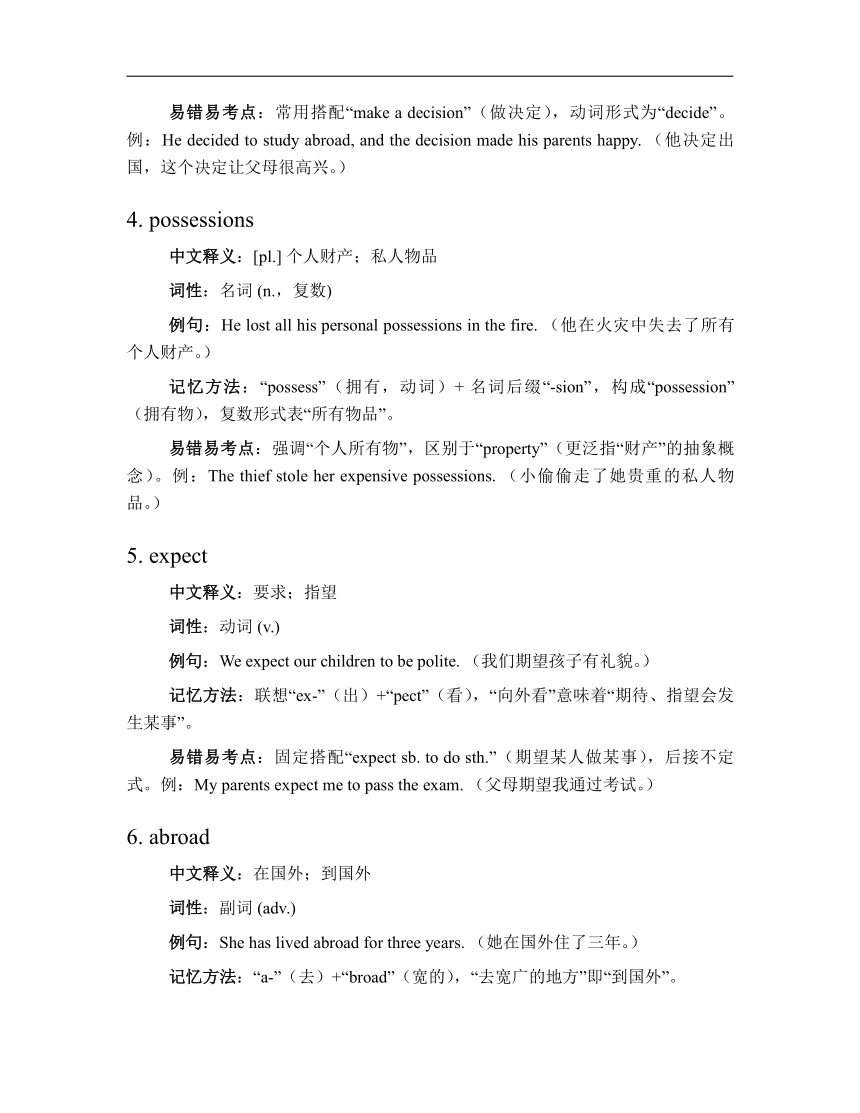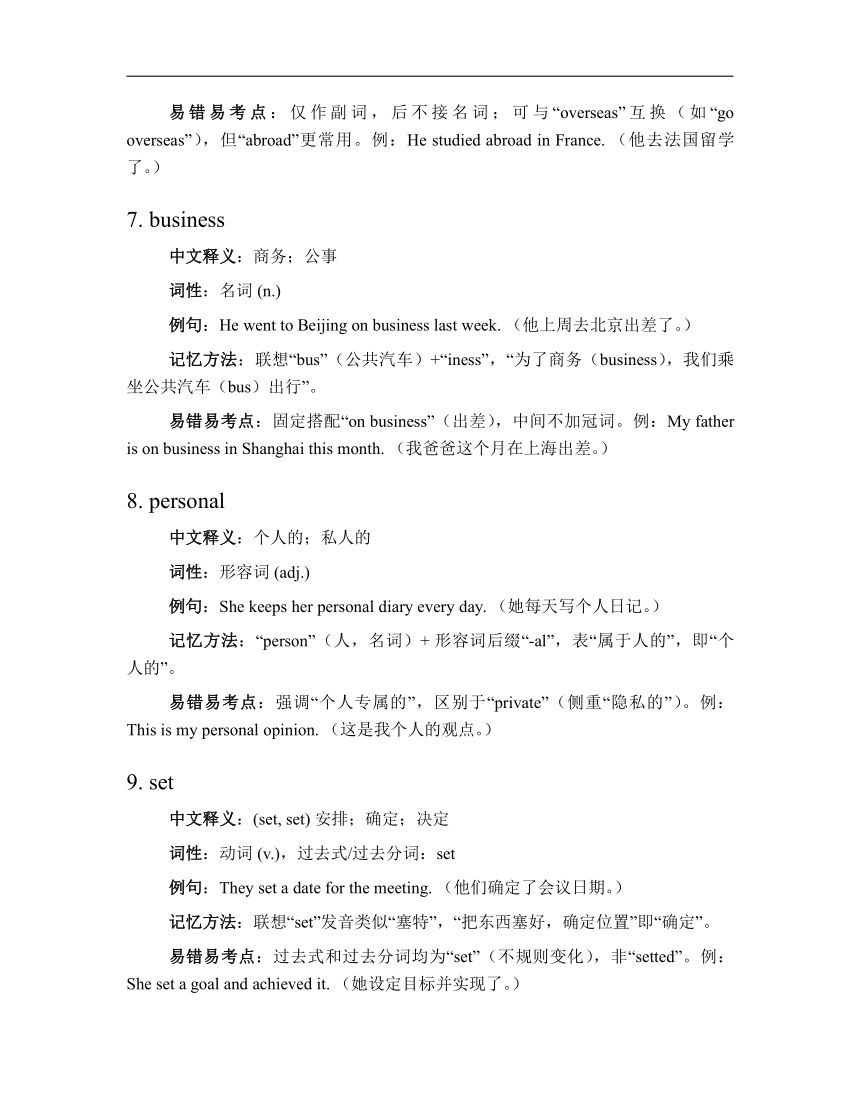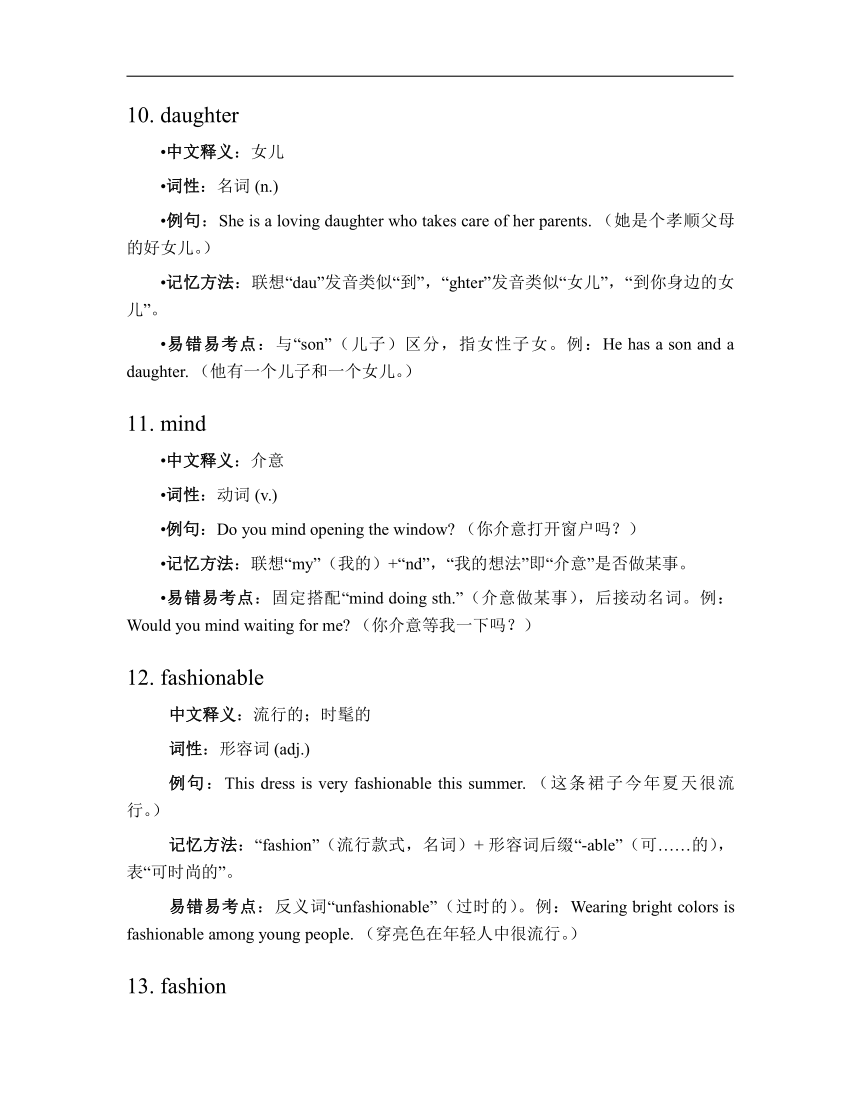Module 2 Ideas and viewpoints Unit 3 单词讲义 沪教牛津版英语九年级上册
文档属性
| 名称 | Module 2 Ideas and viewpoints Unit 3 单词讲义 沪教牛津版英语九年级上册 |

|
|
| 格式 | docx | ||
| 文件大小 | 33.2KB | ||
| 资源类型 | 教案 | ||
| 版本资源 | 牛津深圳版 | ||
| 科目 | 英语 | ||
| 更新时间 | 2025-08-20 00:00:00 | ||
图片预览




文档简介
Unit 3 Family life 英语单词精讲讲义 沪教牛津版2025
meal
中文释义:一顿饭
词性:名词 (n.)
例句:I usually have a simple meal at noon. (我通常在中午吃一顿简单的饭。)
记忆方法:联想“meal”发音近似“米偶”,一顿饭(meal)里有“米”(米偶),通过食物联想记忆。
易错易考点:注意与“diet”区分。“meal”指“一顿具体的饭”,而“diet”强调“为健康或减肥的规定饮食”。例:She follows a healthy diet. (她遵循健康饮食。)
share
中文释义:把自己的想法(或经历、感情)告诉(某人)
词性:动词 (v.)
例句:She often shares her happiness with her family. (她经常和家人分享自己的快乐。)
记忆方法:词根联想,“share”来自中古英语“scharen”,意为“分开、分配”,“sh”可联想“手(hand)”,用手把东西分给别人即“分享”。
易错易考点:固定搭配“share sth. with sb.”(和某人分享某物),注意介词用“with”。例:He shared his toys with the children. (他和孩子们分享了玩具。)
decision
中文释义:决定;抉择
词性:名词 (n.)
例句:After much thought, she made a difficult decision. (经过深思熟虑,她做了一个艰难的决定。)
记忆方法:词根记忆,动词“decide”(决定)+ 名词后缀“-ion”,构成“decision”(被决定的结果)。
易错易考点:常用搭配“make a decision”(做决定),动词形式为“decide”。例:He decided to study abroad, and the decision made his parents happy. (他决定出国,这个决定让父母很高兴。)
possessions
中文释义:[pl.] 个人财产;私人物品
词性:名词 (n.,复数)
例句:He lost all his personal possessions in the fire. (他在火灾中失去了所有个人财产。)
记忆方法:“possess”(拥有,动词)+ 名词后缀“-sion”,构成“possession”(拥有物),复数形式表“所有物品”。
易错易考点:强调“个人所有物”,区别于“property”(更泛指“财产”的抽象概念)。例:The thief stole her expensive possessions. (小偷偷走了她贵重的私人物品。)
expect
中文释义:要求;指望
词性:动词 (v.)
例句:We expect our children to be polite. (我们期望孩子有礼貌。)
记忆方法:联想“ex-”(出)+“pect”(看),“向外看”意味着“期待、指望会发生某事”。
易错易考点:固定搭配“expect sb. to do sth.”(期望某人做某事),后接不定式。例:My parents expect me to pass the exam. (父母期望我通过考试。)
abroad
中文释义:在国外;到国外
词性:副词 (adv.)
例句:She has lived abroad for three years. (她在国外住了三年。)
记忆方法:“a-”(去)+“broad”(宽的),“去宽广的地方”即“到国外”。
易错易考点:仅作副词,后不接名词;可与“overseas”互换(如“go overseas”),但“abroad”更常用。例:He studied abroad in France. (他去法国留学了。)
business
中文释义:商务;公事
词性:名词 (n.)
例句:He went to Beijing on business last week. (他上周去北京出差了。)
记忆方法:联想“bus”(公共汽车)+“iness”,“为了商务(business),我们乘坐公共汽车(bus)出行”。
易错易考点:固定搭配“on business”(出差),中间不加冠词。例:My father is on business in Shanghai this month. (我爸爸这个月在上海出差。)
personal
中文释义:个人的;私人的
词性:形容词 (adj.)
例句:She keeps her personal diary every day. (她每天写个人日记。)
记忆方法:“person”(人,名词)+ 形容词后缀“-al”,表“属于人的”,即“个人的”。
易错易考点:强调“个人专属的”,区别于“private”(侧重“隐私的”)。例:This is my personal opinion. (这是我个人的观点。)
set
中文释义:(set, set) 安排;确定;决定
词性:动词 (v.),过去式/过去分词:set
例句:They set a date for the meeting. (他们确定了会议日期。)
记忆方法:联想“set”发音类似“塞特”,“把东西塞好,确定位置”即“确定”。
易错易考点:过去式和过去分词均为“set”(不规则变化),非“setted”。例:She set a goal and achieved it. (她设定目标并实现了。)
daughter
中文释义:女儿
词性:名词 (n.)
例句:She is a loving daughter who takes care of her parents. (她是个孝顺父母的好女儿。)
记忆方法:联想“dau”发音类似“到”,“ghter”发音类似“女儿”,“到你身边的女儿”。
易错易考点:与“son”(儿子)区分,指女性子女。例:He has a son and a daughter. (他有一个儿子和一个女儿。)
mind
中文释义:介意
词性:动词 (v.)
例句:Do you mind opening the window (你介意打开窗户吗?)
记忆方法:联想“my”(我的)+“nd”,“我的想法”即“介意”是否做某事。
易错易考点:固定搭配“mind doing sth.”(介意做某事),后接动名词。例:Would you mind waiting for me (你介意等我一下吗?)
fashionable
中文释义:流行的;时髦的
词性:形容词 (adj.)
例句:This dress is very fashionable this summer. (这条裙子今年夏天很流行。)
记忆方法:“fashion”(流行款式,名词)+ 形容词后缀“-able”(可……的),表“可时尚的”。
易错易考点:反义词“unfashionable”(过时的)。例:Wearing bright colors is fashionable among young people. (穿亮色在年轻人中很流行。)
fashion
中文释义:流行款式;时兴式样
词性:名词 (n.)
例句:She always follows the latest fashion. (她总是追随时尚。)
记忆方法:“fash”(发音联想“发时”)+“ion”,“头发时兴的样式”即“流行款式”。
易错易考点:固定短语“in fashion”(流行)、“out of fashion”(过时)。例:Bell-bottom pants were in fashion in the 1970s. (喇叭裤20世纪70年代很流行。)
out of date
中文释义:过时的
词性:介词短语 (prep. phrase)
例句:This old phone is out of date now. (这部旧手机现在已经过时了。)
记忆方法:“out of”(超出)+“date”(日期),“超出当前日期的”即“过时的”。
易错易考点:反义词“in fashion”(流行)或“up-to-date”(最新的)。例:His ideas are out of date and no longer useful. (他的观点过时了,不再有用。)
iron
中文释义:(用熨斗)熨;烫平
词性:动词 (v.)
例句:She irons her shirts every morning. (她每天早上熨衬衫。)
记忆方法:“iron”本身是“铁”,“用铁做的熨斗熨烫”。
易错易考点:过去式/过去分词“ironed”,第三人称单数“irons”(规则变化)。例:I need to iron my suit for the meeting. (开会前我需要熨西装。)
event
中文释义:公开活动
词性:名词 (n.)
例句:The school held a sports event last week. (学校上周举办了体育活动。)
记忆方法:“e-”(出)+“vent”(来),“出来的活动”即“公开活动”。
易错易考点:指“有组织的公开活动”,区别于“incident”(小事/意外事件)。例:The fashion show is an important social event. (这场时装秀是重要的社交活动。)
suppose
中文释义:(根据所知)认为
词性:动词 (v.)
例句:I suppose he will come to the party. (我认为他会来参加派对。)
记忆方法:“sup-”(下)+“pose”(放),“在下面放置想法”即“认为、猜想”。
易错易考点:可用于建议,如“Suppose we go by bus.”(我们坐公交去吧?)。例:I suppose you are right. (我认为你说得对。)
relationship
中文释义:关系;联系
词性:名词 (n.)
例句:Good communication builds strong relationships. (良好沟通建立牢固关系。)
记忆方法:“relation”(关系,名词)+ 后缀“-ship”(表“关系”),构成“relationship”。
易错易考点:指“人与人之间的关系”,“relation”可指“事物间的联系”。例:She has a close relationship with her friends. (她和朋友关系亲密。)
invite
中文释义:邀请
词性:动词 (v.)
例句:They invited us to their wedding. (他们邀请我们参加婚礼。)
记忆方法:“in-”(进入)+“vit”(生命)+“-e”,“邀请进入生活”即“邀请”。
易错易考点:名词形式“invitation”,固定搭配“invite sb. to do sth.”(邀请某人做某事)。例:He invited her to dance. (他邀请她跳舞。)
cost
中文释义:(cost, cost) 需付费;价钱为
词性:动词 (v.),过去式/过去分词:cost
例句:This book costs 30 yuan. (这本书30元。)
记忆方法:联想“cost”发音类似“靠死”,“花钱靠死(cost)”。
易错易考点:主语为物,区别于“spend”(主语为人)、“take”(常用“it”作形式主语)。例:The trip cost us 1000 yuan. (这次旅行花了我们1000元。)
type
中文释义:类型;种类
词性:名词 (n.)
例句:There are different types of flowers in the garden. (花园里有不同种类的花。)
记忆方法:“typ”(印)+“e”,“印刷出来的不同种类”即“类型”。
易错易考点:常用“a type of”(一种)、“different types of”(不同种类的)。例:This is a new type of computer. (这是新型电脑。)
help with
中文释义:帮着做
词性:动词短语 (v. phrase)
例句:Can you help me with my homework (你能帮我做家庭作业吗?)
记忆方法:“help”(帮助)+“with”(关于),“帮助关于某事”即“帮着做”。
易错易考点:与“help sb. (to) do sth.”(帮助做某事)并列,注意搭配。例:She helped me (to) clean the room. (她帮我打扫房间。)
(be) on business
中文释义:出差
词性:介词短语 (prep. phrase)
例句:My father is on business in Beijing. (我爸爸在北京出差。)
记忆方法:“on”(处于……状态)+“business”(商务),“处于商务状态”即“出差”。
易错易考点:中间不加冠词,区别于“on the bus”(在公交车上)。例:He went to Shanghai on business last month. (他上个月去上海出差了。)
have no interest in
中文释义:对……没有兴趣
词性:动词短语 (v. phrase)
例句:She has no interest in sports. (她对体育没有兴趣。)
记忆方法:“have”(有)+“no”(没有)+“interest”(兴趣)+“in”(在……方面),“某方面没兴趣”。
易错易考点:“have interest in”表“对……感兴趣”,否定“have no interest in”。例:He has great interest in learning English. (他对学英语兴趣浓厚。)
meal
中文释义:一顿饭
词性:名词 (n.)
例句:I usually have a simple meal at noon. (我通常在中午吃一顿简单的饭。)
记忆方法:联想“meal”发音近似“米偶”,一顿饭(meal)里有“米”(米偶),通过食物联想记忆。
易错易考点:注意与“diet”区分。“meal”指“一顿具体的饭”,而“diet”强调“为健康或减肥的规定饮食”。例:She follows a healthy diet. (她遵循健康饮食。)
share
中文释义:把自己的想法(或经历、感情)告诉(某人)
词性:动词 (v.)
例句:She often shares her happiness with her family. (她经常和家人分享自己的快乐。)
记忆方法:词根联想,“share”来自中古英语“scharen”,意为“分开、分配”,“sh”可联想“手(hand)”,用手把东西分给别人即“分享”。
易错易考点:固定搭配“share sth. with sb.”(和某人分享某物),注意介词用“with”。例:He shared his toys with the children. (他和孩子们分享了玩具。)
decision
中文释义:决定;抉择
词性:名词 (n.)
例句:After much thought, she made a difficult decision. (经过深思熟虑,她做了一个艰难的决定。)
记忆方法:词根记忆,动词“decide”(决定)+ 名词后缀“-ion”,构成“decision”(被决定的结果)。
易错易考点:常用搭配“make a decision”(做决定),动词形式为“decide”。例:He decided to study abroad, and the decision made his parents happy. (他决定出国,这个决定让父母很高兴。)
possessions
中文释义:[pl.] 个人财产;私人物品
词性:名词 (n.,复数)
例句:He lost all his personal possessions in the fire. (他在火灾中失去了所有个人财产。)
记忆方法:“possess”(拥有,动词)+ 名词后缀“-sion”,构成“possession”(拥有物),复数形式表“所有物品”。
易错易考点:强调“个人所有物”,区别于“property”(更泛指“财产”的抽象概念)。例:The thief stole her expensive possessions. (小偷偷走了她贵重的私人物品。)
expect
中文释义:要求;指望
词性:动词 (v.)
例句:We expect our children to be polite. (我们期望孩子有礼貌。)
记忆方法:联想“ex-”(出)+“pect”(看),“向外看”意味着“期待、指望会发生某事”。
易错易考点:固定搭配“expect sb. to do sth.”(期望某人做某事),后接不定式。例:My parents expect me to pass the exam. (父母期望我通过考试。)
abroad
中文释义:在国外;到国外
词性:副词 (adv.)
例句:She has lived abroad for three years. (她在国外住了三年。)
记忆方法:“a-”(去)+“broad”(宽的),“去宽广的地方”即“到国外”。
易错易考点:仅作副词,后不接名词;可与“overseas”互换(如“go overseas”),但“abroad”更常用。例:He studied abroad in France. (他去法国留学了。)
business
中文释义:商务;公事
词性:名词 (n.)
例句:He went to Beijing on business last week. (他上周去北京出差了。)
记忆方法:联想“bus”(公共汽车)+“iness”,“为了商务(business),我们乘坐公共汽车(bus)出行”。
易错易考点:固定搭配“on business”(出差),中间不加冠词。例:My father is on business in Shanghai this month. (我爸爸这个月在上海出差。)
personal
中文释义:个人的;私人的
词性:形容词 (adj.)
例句:She keeps her personal diary every day. (她每天写个人日记。)
记忆方法:“person”(人,名词)+ 形容词后缀“-al”,表“属于人的”,即“个人的”。
易错易考点:强调“个人专属的”,区别于“private”(侧重“隐私的”)。例:This is my personal opinion. (这是我个人的观点。)
set
中文释义:(set, set) 安排;确定;决定
词性:动词 (v.),过去式/过去分词:set
例句:They set a date for the meeting. (他们确定了会议日期。)
记忆方法:联想“set”发音类似“塞特”,“把东西塞好,确定位置”即“确定”。
易错易考点:过去式和过去分词均为“set”(不规则变化),非“setted”。例:She set a goal and achieved it. (她设定目标并实现了。)
daughter
中文释义:女儿
词性:名词 (n.)
例句:She is a loving daughter who takes care of her parents. (她是个孝顺父母的好女儿。)
记忆方法:联想“dau”发音类似“到”,“ghter”发音类似“女儿”,“到你身边的女儿”。
易错易考点:与“son”(儿子)区分,指女性子女。例:He has a son and a daughter. (他有一个儿子和一个女儿。)
mind
中文释义:介意
词性:动词 (v.)
例句:Do you mind opening the window (你介意打开窗户吗?)
记忆方法:联想“my”(我的)+“nd”,“我的想法”即“介意”是否做某事。
易错易考点:固定搭配“mind doing sth.”(介意做某事),后接动名词。例:Would you mind waiting for me (你介意等我一下吗?)
fashionable
中文释义:流行的;时髦的
词性:形容词 (adj.)
例句:This dress is very fashionable this summer. (这条裙子今年夏天很流行。)
记忆方法:“fashion”(流行款式,名词)+ 形容词后缀“-able”(可……的),表“可时尚的”。
易错易考点:反义词“unfashionable”(过时的)。例:Wearing bright colors is fashionable among young people. (穿亮色在年轻人中很流行。)
fashion
中文释义:流行款式;时兴式样
词性:名词 (n.)
例句:She always follows the latest fashion. (她总是追随时尚。)
记忆方法:“fash”(发音联想“发时”)+“ion”,“头发时兴的样式”即“流行款式”。
易错易考点:固定短语“in fashion”(流行)、“out of fashion”(过时)。例:Bell-bottom pants were in fashion in the 1970s. (喇叭裤20世纪70年代很流行。)
out of date
中文释义:过时的
词性:介词短语 (prep. phrase)
例句:This old phone is out of date now. (这部旧手机现在已经过时了。)
记忆方法:“out of”(超出)+“date”(日期),“超出当前日期的”即“过时的”。
易错易考点:反义词“in fashion”(流行)或“up-to-date”(最新的)。例:His ideas are out of date and no longer useful. (他的观点过时了,不再有用。)
iron
中文释义:(用熨斗)熨;烫平
词性:动词 (v.)
例句:She irons her shirts every morning. (她每天早上熨衬衫。)
记忆方法:“iron”本身是“铁”,“用铁做的熨斗熨烫”。
易错易考点:过去式/过去分词“ironed”,第三人称单数“irons”(规则变化)。例:I need to iron my suit for the meeting. (开会前我需要熨西装。)
event
中文释义:公开活动
词性:名词 (n.)
例句:The school held a sports event last week. (学校上周举办了体育活动。)
记忆方法:“e-”(出)+“vent”(来),“出来的活动”即“公开活动”。
易错易考点:指“有组织的公开活动”,区别于“incident”(小事/意外事件)。例:The fashion show is an important social event. (这场时装秀是重要的社交活动。)
suppose
中文释义:(根据所知)认为
词性:动词 (v.)
例句:I suppose he will come to the party. (我认为他会来参加派对。)
记忆方法:“sup-”(下)+“pose”(放),“在下面放置想法”即“认为、猜想”。
易错易考点:可用于建议,如“Suppose we go by bus.”(我们坐公交去吧?)。例:I suppose you are right. (我认为你说得对。)
relationship
中文释义:关系;联系
词性:名词 (n.)
例句:Good communication builds strong relationships. (良好沟通建立牢固关系。)
记忆方法:“relation”(关系,名词)+ 后缀“-ship”(表“关系”),构成“relationship”。
易错易考点:指“人与人之间的关系”,“relation”可指“事物间的联系”。例:She has a close relationship with her friends. (她和朋友关系亲密。)
invite
中文释义:邀请
词性:动词 (v.)
例句:They invited us to their wedding. (他们邀请我们参加婚礼。)
记忆方法:“in-”(进入)+“vit”(生命)+“-e”,“邀请进入生活”即“邀请”。
易错易考点:名词形式“invitation”,固定搭配“invite sb. to do sth.”(邀请某人做某事)。例:He invited her to dance. (他邀请她跳舞。)
cost
中文释义:(cost, cost) 需付费;价钱为
词性:动词 (v.),过去式/过去分词:cost
例句:This book costs 30 yuan. (这本书30元。)
记忆方法:联想“cost”发音类似“靠死”,“花钱靠死(cost)”。
易错易考点:主语为物,区别于“spend”(主语为人)、“take”(常用“it”作形式主语)。例:The trip cost us 1000 yuan. (这次旅行花了我们1000元。)
type
中文释义:类型;种类
词性:名词 (n.)
例句:There are different types of flowers in the garden. (花园里有不同种类的花。)
记忆方法:“typ”(印)+“e”,“印刷出来的不同种类”即“类型”。
易错易考点:常用“a type of”(一种)、“different types of”(不同种类的)。例:This is a new type of computer. (这是新型电脑。)
help with
中文释义:帮着做
词性:动词短语 (v. phrase)
例句:Can you help me with my homework (你能帮我做家庭作业吗?)
记忆方法:“help”(帮助)+“with”(关于),“帮助关于某事”即“帮着做”。
易错易考点:与“help sb. (to) do sth.”(帮助做某事)并列,注意搭配。例:She helped me (to) clean the room. (她帮我打扫房间。)
(be) on business
中文释义:出差
词性:介词短语 (prep. phrase)
例句:My father is on business in Beijing. (我爸爸在北京出差。)
记忆方法:“on”(处于……状态)+“business”(商务),“处于商务状态”即“出差”。
易错易考点:中间不加冠词,区别于“on the bus”(在公交车上)。例:He went to Shanghai on business last month. (他上个月去上海出差了。)
have no interest in
中文释义:对……没有兴趣
词性:动词短语 (v. phrase)
例句:She has no interest in sports. (她对体育没有兴趣。)
记忆方法:“have”(有)+“no”(没有)+“interest”(兴趣)+“in”(在……方面),“某方面没兴趣”。
易错易考点:“have interest in”表“对……感兴趣”,否定“have no interest in”。例:He has great interest in learning English. (他对学英语兴趣浓厚。)
